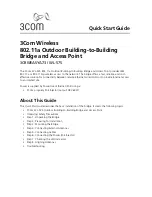
C H A P T E R
4
Wireless Bridge
This chapter describes how to configure the Wireless Bridge settings. It contains the following topics:
•
•
Configuring WDS Bridge, page 56
•
•
•
Wireless Bridge
The Wireless Distribution System (WDS) allows you to connect multiple WAP devices. With WDS, the WAP
devices communicate with one another wirelessly. This provides a seamless experience for roaming the clients
and managing multiple wireless networks. You can configure the WAP device in point-to-point or
point-to-multipoint bridge mode based on the number of links to connect.
In the point-to-point mode, the WAP device accepts client associations and communicates with the wireless
clients. The WAP device forwards all traffic meant for the other network over the tunnel that is established
between the access points. The bridge does not add to the hop count. It functions as a simple OSI Layer 2
network device.
In the point-to-multipoint bridge mode, one WAP device acts as the common link between multiple access
points. In this mode, the central WAP device accepts the client associations and communicates with the clients.
All other access points associate only with the central WAP device that forwards the packets to the appropriate
wireless bridge for routing purposes.
The WAP device can also act as a repeater. In this mode, the WAP device serves as a connection between
two WAP devices that may be too far apart to be within cell range. When acting as a repeater, the WAP device
does not have a wired connection to the LAN and repeats signals by using the wireless connection. No special
configuration is required for the WAP device to function as a repeater, and there are no repeater mode settings.
The wireless clients can still connect to an WAP device that is operating as a repeater.
Before you configure WDS on the WAP device, note these guidelines:
•
All Cisco WAP devices participating in a WDS link must have the following identical settings:
◦
Radio
Cisco WAP125 Wireless-AC/N Dual Band Desktop Access Point with PoE
55
















































